In this community, these sports journalists focus on what the people want: entertaining local coverage.
| 2019 Q2 | story by Dr. Mike Anderson | photos by Steven Hertzog

Kevin Romary, Sports Anchor for Midco Sports
When it comes to this community, it’s not hyperbole to claim that sports is king. To use a sports analogy: Watching, talking and listening to college and high school sports in Lawrence is par for the course. I’d be willing to bet you a plate of Merchant’s brussels sprouts that more of the Douglas County population could recognize the names, faces or voices of the people in this article than those of the current mayor, city manager, county administrator or local state politicians.
Take Tyler Jones, for example. Tyler is a student at KU with a golden voice who hosts a weekend sports talk show on KLWN. He also cohosts one of its morning sports shows from 6 to 8 a.m. Tyler has close to 7,000 followers on Twitter. While talking with him, he received a notice on his phone from ESPN. The person on the other end wanted to know if they could use the video Tyler shot of KU football coach Les Miles dancing on stage at the Rick Ross concert that followed the annual KU spring game. At that time, it had been retweeted more than 200 times.
That’s the power of KU sports, and no one knows that better than the entertainers, journalists and broadcasters who cover these local sports. These entertainers aren’t talking much about the Royals, Chiefs or national news. They know people will turn to Kansas City stations or ESPN for that. So how can they be different? Being informative is important, but more than that, they need to be entertaining and interesting to get people to watch and listen. They all focus on KU sports and/or local high school sports to bring in viewers, listeners or subscribers to their platforms. And in this community, we’re interested in what they have to say.
Our Sports on Television
Let’s begin with the person who has been here the longest, Kevin Romary. He has been with Channel6/Midco Sports Network since 1997. During the majority of that time, he has served as sports director. He’s been to five Final Fours, countless tournament games and even more KU games. “Safe insanity” is how Romary describes the experience of covering KU basketball. “I’ve been to other places and seen games there, and it’s different. I’ve been to Final Fours and tournament games, and seen other fan bases, and this is a one-of-a-kind experience,” Romary explains.
KU basketball for him is always a beloved story, but what is really important are the personal experiences and telling the individual stories of some of the KU and high school kids who have a rare talent. Instead of trying to work his way to the front of a media storm to ask Coach Bill Self a question, Romary stays behind to tell the stories of a kid in one of the Olympic sports that is blowing up. He remembers getting a phone call from then KU golf coach Ross Randall about Gary Woodland. He then found himself doing a story with Gary at the Alvamar driving range. “In hindsight, that is pretty cool. 15 years later, he’s one of the top 25 golfers on the planet. Think about that for a minute. We’ve had a lot of great basketball players come through like Joel Embiid. But I don’t know if he’s one of the top 25 players in the world. There are world-class athletes just roaming around Lawrence, Kansas,” Romary explains.
Currently, Romary focuses a lot of his time on high school sports. This includes hosting a Monday through Friday 30-minute television sports show and doing the play-by-play for high school football, basketball, baseball, softball, swimming, wrestling and volleyball. Romary and his team believe high school is underrepresented in terms of coverage. “When you look at social media now, it kind of confirms what we already knew. You should see how many views the high school sports get compared to KU sports. The response we get on calling the city showdown, regardless of the sport, is huge,” he explains.
Romary’s mentor was Tom Hedrick, the guy who wrote the book on sports broadcasting, literally. Hedrick taught Romary to never try to be somebody else. So that’s what Romary has done. His style focuses on keeping it light. “As I get older, I just want to have a conversation. Different topics. It doesn’t have to be even sports related, because we are so inundated with so many different channels and avenues where we can get that stuff.”
Romary uses the word fun and funny to describe what he wants to do. “And that’s changed. When I was younger, the thought was, ‘oh you want to take it so seriously.’ ” Romary doesn’t mind if people need to laugh with him or at him. He just hopes they don’t think it’s too serious. He gets to know the audience here more than bigger markets. The audience often thinks they know the people on TV and news, and here, that is true.
Romary’s entertainment plays out in a journalistic way. “Ours is not an opinion show. That’s the difference between media today as opposed to 25 years ago. There weren’t many opinion-based shows. It’s important to divide commentary and opinion from actual news and sports reporting,” Romary says. He hopes people look at his show as a credible and informative way to catch up on local sports. So if people want to know if their neighbor’s kid is going to be the next Chief, Royal or KU athlete, they can turn to him for the answer. “I think that’s our niche here.”
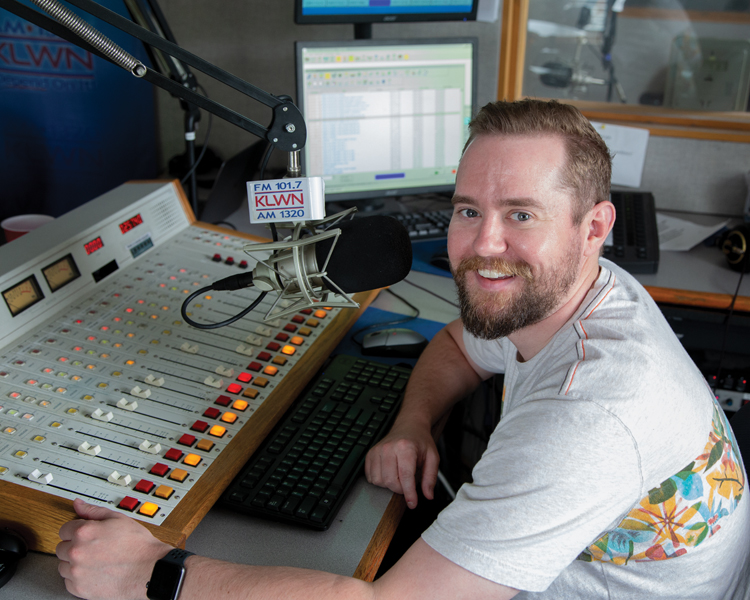
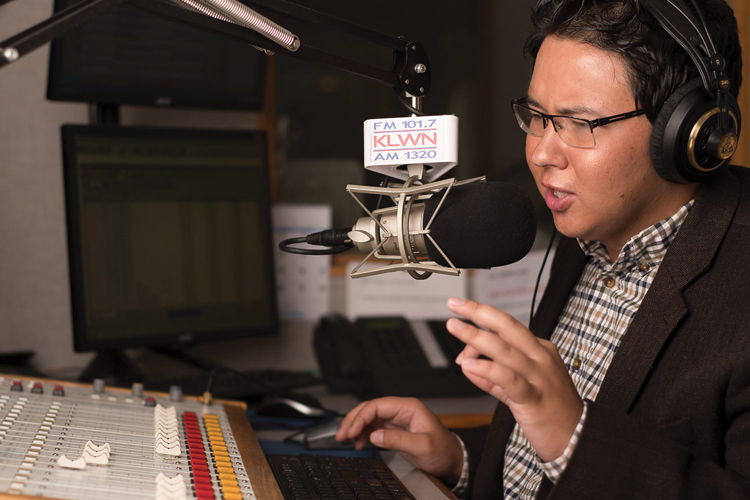 Top to Bottom: Nick Schwerdt hosts Rock Chalk Sports on KLWN – Tyler Jones hosts multiple shows on KLWN
Top to Bottom: Nick Schwerdt hosts Rock Chalk Sports on KLWN – Tyler Jones hosts multiple shows on KLWN
Sports Talk Radio
Nick Schwerdt hosts the afternoon Rock Chalk Sports Talk on KLWN. He has been the host for four years and understands the pressure of being one of the main people KU fans listen to about Jayhawk sports. For alumni of KU or fans outside of Lawrence, his podcast and KLWN might be the only source they can listen to for KU sports. At a recent KU game, a fan went up to Schwerdt to let him know he lives in Chicago and listens to the podcast. Another fan from Las Vegas told him he listens to the podcast everyday. “It is pressure. I’m the only person talking about KU basketball for three hours a day. There’s a huge responsibility to give them a product they could be proud of.”
Schwerdt, Jones and all the hosts at KLWN know the task is to keep people engaged. During the summer months, especially when KU is not in session, originality and entertaining become key. “There is a bit of a responsibility not to be cookie-cutter but at least try to shift the conversation and start new conversations. Trying to find a new perspective when you’re doing 15 hours a week,” Schwerdt says. His goal is not to convince but to think about a different perspective. He considers himself part entertainer and part journalist.
“I take the job seriously,” Schwerdt explains. “But I don’t take myself seriously.” For him, originality is important. It’s a blend of giving people a new perspective while also having quality substance. As he says, “You have to be passionate. You have to be 100 percent on it, or the audience will check out. A lot of people will say that sports radio should sound like you and your buddies on the couch, but it’s more than that; it’s the best version of you and your buddies on the couch.”
For radio hosts like Schwerdt, the job isn’t to just report. People are tuning in to hear their opinion. These sports talk radio hosts all agree they are more entertainers than journalists. But sometimes, that is tough in a community that values college and high school sports involving amateur athletes who are often teenagers. Traug Keller, who oversees all aspects of ESPN radio, has publicly told his on-air hosts that if you’re not getting in trouble once in awhile, you’re not pushing things enough.
That line between being interesting and being critical can be tough at KLWN. As Schwerdt explains, “If so and so has a bad game for KU, I can’t really come on the air and be like, ‘They need to bench this kid, he’s a bum, he’s talentless.’ I’m like, ‘He’s a kid.’ And that’s a balance to walk, because if you’re not being critical, how are you going to be interesting?” But at the same time, Schwerdt explains people don’t want him to use cookie-cutter language like, ‘Oh, he’s young, don’t worry, he’ll get better.’ It can be hard to be critical of young athletes, and sometimes, it’s Schwerdt’s responsibility to be the voice of reason, to mellow things out after a big loss. “If the freak-out is justified, then I’ll join them in that; but the issue with that is with college, a lot of times the freak-out is over the decisions made by a kid.” But voicing criticism of the coaches or administrators is a different story. “I’ve never been afraid to voice my opinion on that, because there is a real responsibility there. That’s the only part of me that feels like a journalist.”

Brian Hanni at the Rock Chalk Choice Awards, in a Back to the Future themed event. Photo by Rachel Pincus
Play-by-Play Broadcasting
Perhaps no one understands the pressure to entertain in this town more than KU athletics director of broadcasting Brian Hanni. By the end of this 2018-2019 KU athletics season, Brian will have called around 90 games, emceed roughly 100 charitable events and hosted roughly 30 Hawk Talks. The basketball broadcasts he conducts with cohost Greg Gurley have been in the Top 3 in the nation for basketball on the TuneIn app. His reach is great. With the use of social media, Hanni knows the days radio guys are only heard not seen are long gone. It’s a wide-reaching but also highly visible position. Hanni can’t just be an average play-by-play guy. He explains, “It’s incredible the fan response and how engaged they are and how much they want any extra insight they can possibly get their hands on about KU sports. And it’s way different than what I was used to when I lived in Lubbock and trying to be an ambassador for Texas Tech. And I mean that respectfully to all other places, I’m just saying this place is different.”
During the KU season, Hanni strives to entertain the KU faithful by trying to be as rich and diverse as possible with the terms he uses. Mixing metaphors and highlight calls are important to him. “You want to be informative, engaging and entertaining, yes,” he says. “But as a play-by-play guy first and foremost, it’s about the action on display in front of you. It’s your job to paint the picture. How beautifully and artistically you paint it is where the entertainment side comes in. Always remember the picture itself is what sells, the picture itself is why they are listening.”
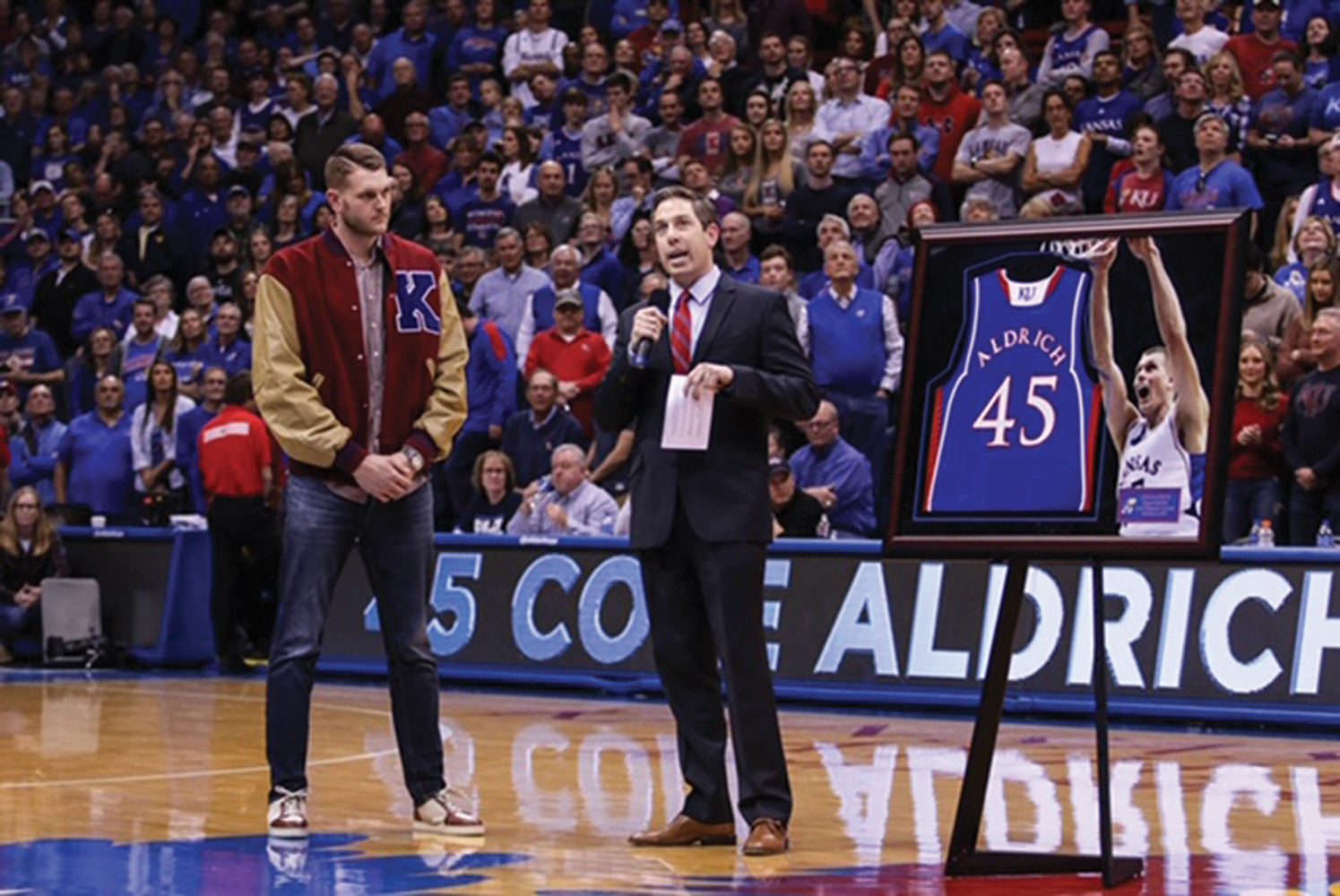
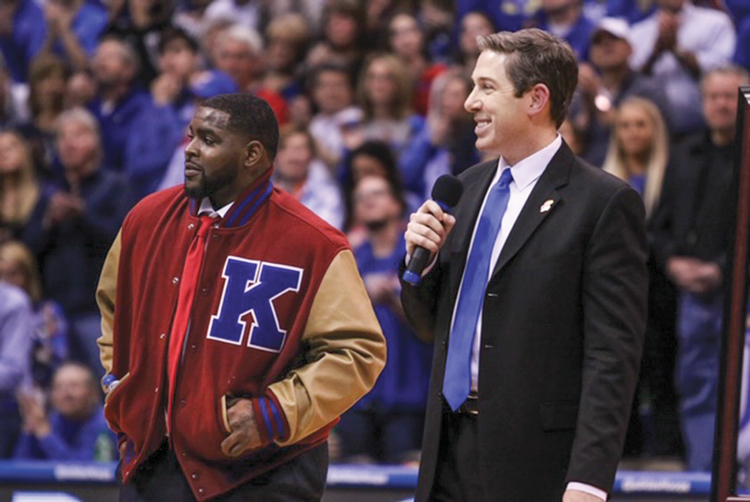 Top to Bottom: Brian as the Master of ceremonies at the hanging of the jerseys for KU basketball All-Americans Cole Aldrich and Sherron Collins. photos by Jeff Jacobson
Top to Bottom: Brian as the Master of ceremonies at the hanging of the jerseys for KU basketball All-Americans Cole Aldrich and Sherron Collins. photos by Jeff Jacobson
Hanni points out the sport itself is the “meat and potatoes.” The announcers should be considered the side dish that adds to the meal. One of his goals for every game is to let his personality shine in a way that adds to the game instead of taking from it. “I try to be a wordsmith that puts the right descriptors on those highlight plays and use my vocal inflection to capture the excitement in the Phog of 16,300,” Hanni says. The ability to know how and when to elevate one’s voice is crucial for any broadcaster.
The Preparation for These Shows
The level of preparation and practice to be a sports reporter, broadcaster, journalist and entertainer is incredible. (Not to mention the amount of time needed to attend games that normally take place at night or on weekends.) On an average night, morning show cohost Jones will go to bed at midnight and get up at 4:15 a.m. He tries to nap in between his morning show, classes and doing the needed research for the show. He also spends plenty of time reevaluating the show. “My parents listen, and they aren’t afraid to tell me when I had a bad show,” Jones explains.
“To me, preparation is a 30,000-foot view,” Schwerdt says. For his afternoon Rock Chalk Sports Talk radio show, he and his producers will prepare 30 minutes for every 15-minute segment. Which means a three-hour show will require close to six hours of preparation. “The worst feeling in the world, and it doesn’t happen very often, is going into a show and being like, ‘Oh I don’t know what we’re going to talk about right there. I got 15 minutes to fill?’ Fifteen minutes is a lot longer than you think when you’ve got a live mic in front of your face. Brian Hanni drilled into my head the preparation aspect, and that’s something that never left me,” Schwerdt explains.
Preparation is paramount if you want to be the voice of the Jayhawks. Being the Jayhawk broadcaster is certainly a hustle. It’s a 10-month grind with two months in July and August to relax. Hanni shows up two hours before the game and stays anywhere from one to three hours after. And sometimes games don’t get over until late. “The hours would sound overwhelming if it wasn’t something so exciting or thrilling,” he explains.
But the work and preparation for the next broadcast is far from over. Hanni charts those for each broadcast to see what he uses when and how often. He listens to and charts every game he calls. And for a season like 2017-2018, when the Jayhawks were making almost 400 three-pointers, it’s tough to have enough different descriptors so as to not repeat them in the same game. The day after the game, he listens to his performance for redundancies, banter with his analyst, his vocal inflections and whether he was able to weave in his preparation to make sure it added and did not distract.
Practice is also important in this profession. When Romary first got to KU, his professor sent him to a Lawrence High football game. For a college kid, that’s not exactly what one wants to do on a Friday night. But he took a recorder, sat on the stands and called the game. “I felt like an idiot the first time; I’m up there in the stands holding my roster and my recorder. But that’s how you get started,” he says. “You have to listen to yourself, because you’ve got to change. It’s not like dunking a basketball where you can or can’t. Anybody can work on their voice, work on their speech, work on their delivery and work their way into being good enough to get on a radio and/or TV station. When you hear yourself and you hate it, be OK with it and try to change it.”
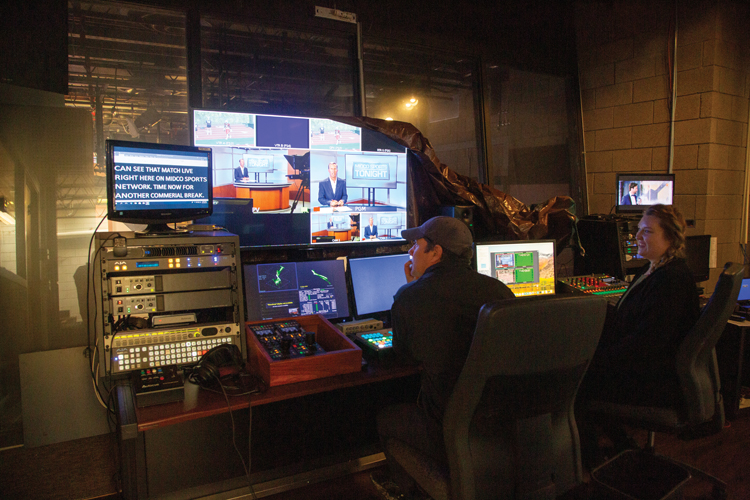
The Midco sports studio control room during a
broadcasting of Kevin Romary’s sports show.
The Connection
All of these entertainers are there own worst critic, constantly analyzing everything about their performances. “I’ve come to this conclusion like most people do: You’re always way more critical of yourself than anybody else. And once you get to that point, it helps,” Romary says. But that self-criticism leads to a great deal of self-analysis and growth.
All these sports broadcasters agree. They are sitting on a gold mine being able to cover sports in this community, but fans here expect them to be interesting, engaging and entertaining as they talk about their beloved teams. Perhaps it is no surprise, then, that all these sports entertainers in Douglas County are connected. Romary and Hanni were both mentored by the same person, Tom Hedrick. While he was the sports director at KLWN, Hanni hired Schwerdt, who works on the sports team with Jones.
So, let me put it like this – Jones is the John Harbaugh who works with Schwerdt. And if Schwerdt is the Andy Reid to Hanni’s Mike Holmgren, and Romary is Dennis Green, then Tom Hedrick is their Bill Walsh. How about that for a sports analogy?
